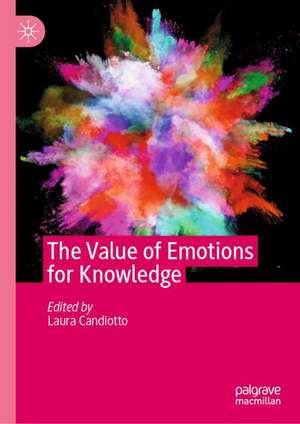The Value of Emotions for Knowledge
Editat de Laura Candiottoen Limba Engleză Hardback – 8 mai 2019
With twelve chapters by leading and up-and-coming academics, this edited collection shows that emotions do count for our epistemic enterprise. Against scepticism about the possible positive role emotions play in knowledge, the authors highlight the how and the why of this potential, lucidly exploring the key aspects of the functionality of emotions. This is explored in relation to: specific kinds of knowledge such as self-understanding, group-knowledge and wisdom; specific functions played by certain emotions in these cases, such as disorientation in enquiry and contempt in practical reason; the affective experience of the epistemic subjects and communities.
Preț: 731.49 lei
Preț vechi: 892.06 lei
-18% Nou
Puncte Express: 1097
Preț estimativ în valută:
139.97€ • 146.51$ • 116.50£
139.97€ • 146.51$ • 116.50£
Carte tipărită la comandă
Livrare economică 31 martie-14 aprilie
Preluare comenzi: 021 569.72.76
Specificații
ISBN-13: 9783030156664
ISBN-10: 3030156664
Pagini: 328
Ilustrații: XV, 310 p. 1 illus.
Dimensiuni: 148 x 210 x 20 mm
Greutate: 0.56 kg
Ediția:1st ed. 2019
Editura: Springer International Publishing
Colecția Palgrave Macmillan
Locul publicării:Cham, Switzerland
ISBN-10: 3030156664
Pagini: 328
Ilustrații: XV, 310 p. 1 illus.
Dimensiuni: 148 x 210 x 20 mm
Greutate: 0.56 kg
Ediția:1st ed. 2019
Editura: Springer International Publishing
Colecția Palgrave Macmillan
Locul publicării:Cham, Switzerland
Cuprins
1. Introduction. From Philosophy of Emotion to Epistemology: Some Questions about the Epistemic Relevance of Emotions, Laura Candiotto.-Section I: Emotional Rationality.- 2. How Emotions Know: Naturalizing Epistemology via Emotions, Cecilia Mun.- 3. What Can Information Encapsulation Tell Us About Emotional Rationality?, Raamy Majeed.- Section II: Emotional Regulatory Affordances.- 4. A Pragmatist View of Emotions: Tracing its Significance for the Current Debate, Roberta Dreon.- 5. Getting Warmer: Predictive Processing and the Nature of Emotion, Sam Wilkinson, George Dean, Kathryn Nave & Andy Clark.- 6. Emotional Reflexivity in Reasoning: The Function of Describing the Environment in Emotion Regulation, Dina Mendonça & João Sàágua.- Section III: The Epistemic Value of Emotions in Self-Understanding.- 7. Moving Stories: Agency, Emotion and Practical Rationality, Dave Ward.- 8. Disorientationand Cognitive Enquiry, Owen Earnshaw.- Section IV: The Epistemic Value of Negative Emotions and Suffering.- 9. Learning from Adversity: Suffering and Wisdom, Michael Brady.- 10. The Grapes of Wrath and Scorn, Pascal Engel.- Section V: The Epistemic Value of Group Level Emotions and Moods.- 11. Emotions In-Between: The Affective Dimension of Participatory Sense-Making, Laura Candiotto.- 12. Group Emotions and Group Epistemology, Anja Berninger.- 13. In Search for the Rationality of Moods, Anthony Hatzimoyisis.
Recenzii
Notă biografică
Laura Candiotto is von Humboldt Senior Research Fellow at the Institute of Philosophy of the Free University of Berlin, Germany. Her research on emotions merges her interest in social epistemology and philosophy of mind, social ontology, theories of happiness and well-being, and the history of philosophy.
Textul de pe ultima copertă
“Philosophical work on emotion has arrived the very heart of our discipline. This superbly curated collection shows how rigorous, inventive and encompassing philosophers of emotion tackle key issues in the theory and ethics of knowing. I’m particularly struck by how smoothly historical and systematic perspectives get interwoven to challenge established ways of construing knowledge. Essential reading for epistemologists, ethicists and emotion scholars alike.”
—Jan Slaby, Professor of Philosophy of Mind at Freie Universität Berlin, Germany
"Laura Candiotto has done a great service to both philosophers of emotion and epistemologists in putting together this exciting new volume that explores the many ways in which emotions contribute to knowledge. The contributions are highly diverse, written by scholars from different traditions and areas of philosophy, including situated cognition, phenomenology, ethics, and more. All philosophers interested in emotion, cognition, and knowledge will thus find something new and valuable in this highly recommended collection."
— Giovanna Colombetti, Associate Professor of Philosophy at Exeter Unviersity, UK
“There has been an upsurge of interesting work on the emotions in recent years, drawing on a range of disciplines. This volume brings together a number of fascinating snapshots of this work, and in the process advances the debate still further. Essential reading for anyone working on the emotions."
— Duncan Pritchard, Chancellor’s Professor of Philosophy, UC Irvine & Professor of Philosophy, University of Edinburgh, UK
This innovative new volume analyses the role of emotions in knowledge acquisition. It focuses on the field of philosophy of emotions at the exciting intersection between epistemology and philosophy of mind and cognitive science to bring us an in-depth analysis of the epistemological value of emotions in reasoning.
With twelve chapters by leading and up-and-coming academics, this edited collection shows that emotions do count for our epistemic enterprise. Against scepticism about the possible positive role emotions play in knowledge, the authors highlight the how and the why of this potential, lucidly exploring the key aspects of the functionality of emotions. This is explored in relation to: specific kinds of knowledge such as self-understanding, group-knowledge and wisdom; specific functions played by certain emotions in these cases, such as disorientation in enquiry and contempt in practical reason; the affective experience of the epistemic subjects and communities.
Caracteristici
Collates twelve full-length articles by leading and up-and-coming academics on the exciting topic of philosophy of emotions Focuses on the different roles that emotions play in our life, particularly their role in knowledge Investigates the epistemological value of emotions in reasoning, a prominent research programme in the cognitive sciences
